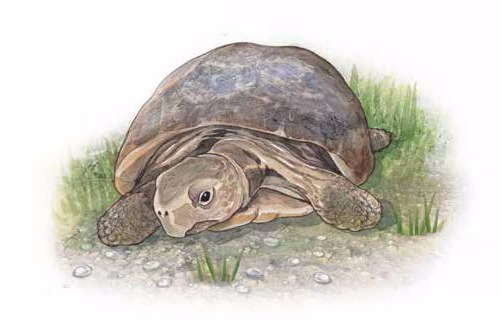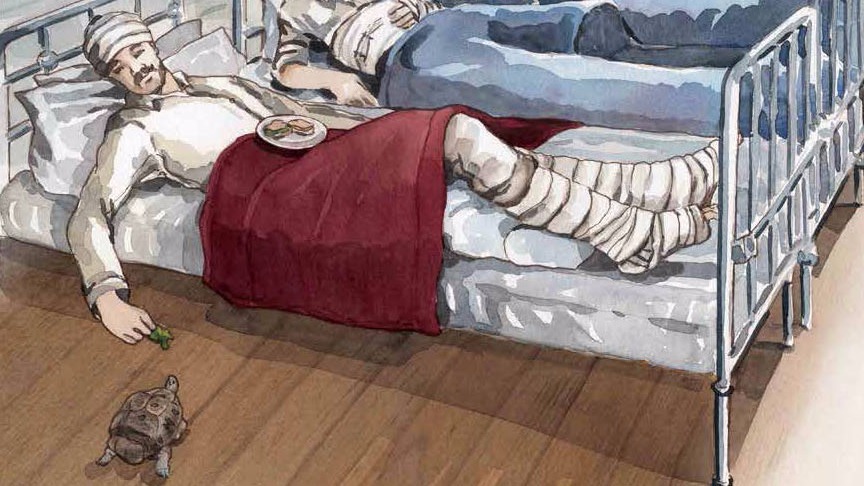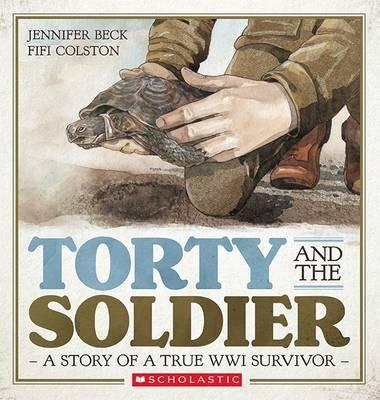David Hill reviews Torty and the Soldier, a picture book about the true story of a very old tortoise, by Jennifer Beck and illustrated by Fifi Colston.

Children’s writers are accustomed to getting judged both on literary grounds and for perceived ethical standards. But a few eyebrows rose some years back when one columnist accused New Zealand practitioners of ‘depriving young readers of their childhoods’.
In translation, this turned out to mean that such authors were daring to go beyond the Blytonesque settings and narratives, the cosy fantasies which the columnist made it clear were the qualities to which all children’s writers should aspire.
The censured writers were even presuming to produce books which included challenges and problems, acknowledged that life can sometimes be imperfect, engaged with the world rather than denied it. Shocking. Why, seeing such truths in print could… could deprive young readers of their childhoods.
Okay, enough of the ponderous irony. I recognise and commend our (good) children’s fantasists. But I also note that one of the strengths of New Zealand writing for young readers is the number of authors and illustrators who work in ways that have aroused / would arouse that columnist’s spleen.
Children’s writers are accustomed to getting judged both on literary grounds and for perceived ethical standards.
They’re the ones whose work celebrates our past and present. They enrich children’s minds by letting them share the complexity and excitement of life at its heightened moments, when ordinary people encounter extraordinary circumstances, all within the structured and protective environment of a book.
Whom do I mean? Across the age-groups from pre-school to late teens, we have Joy Cowley, Kyle Mewburn, Fleur Beale, Bernard Beckett, Jack Lasenby, Maurice Gee (who writes consummately in any genre), Kate De Goldi, Stacey Gregg, the brave Ted Dawe, many others. They’re complemented by illustrators such as Bob Kerr, Lynley Dodd, Robyn Belton, Phoebe Morris, Nikki Slade Robinson, Donovan Bixley, many, many others. My apologies to the numerous worthy folk I’ve omitted.
Plus, of course, there’s Jennifer Beck and Fifi Colston, most recently in this clean, handsome Scholastic NZ picture book for junior readers and listeners.
Torty and the Soldier is a story from New Zealand history, the sort of topic whose sheer aptness makes authors exclaim with glee when/if they encounter it.
In World War One, a young Kiwi medical orderly from a hospital ship moored off Salonika came across a tortoise driven from her home by bombing. Within seconds, a gun carriage ran over the tiny refugee, leaving her injured but alive. As Stewart Little – another felicity, even if the name is spelt differently – nursed Torty back to health, and the shelled, shocked survivor became a mascot to the wounded, Stewart found himself comparing her long life with those of the young men and women killed or dreadfully injured in the war.
They (authors and illustrators) enrich children’s minds by letting them share the complexity and excitement of life at its heightened moments […] all within the structured and protective environment of a book.
Fear not: this isn’t an ‘Issues book’ (dreary, derogatory term). It includes motifs of pacifism, sacrifice, endurance and affection, but above all, it’s an absorbing narrative. It’s a simple one as well, and that’s not the least of its strengths.
If I weren’t such a gentleman, I’d point out that Jennifer Beck has been writing for this age group for … decades, is it, Jennifer? She knows exactly how to build, pace and vary her narrative, as well as what to leave for her illustrator. Episodes are succinct; links neat. A hundred years are crossed, with attention and economy. We step from war to peace; vigorous youth to quiet old age. There’s a satisfying sense of completeness, though I’ll quibble a touch at the marginally sententious final moral.
Torty’s target audience bask in illustrations the way their parents and grandparents bask in a wall of paintings at The Tate, The Met, Te Papa – if Te Papa still has paintings? They pore, point, peer, pat. Anyone who still believes reading or being read to is a passive activity has never really watched a kid with a picture book.

Fifi Colston understands this. Her images in Torty are meticulous and whimsical. Working with a mainly and appropriately subdued palette of browns, greys and khaki, she reinforces the characters (and the tortoise is one), settings, moods. There are excellent alternations of close-up and wide scene, plus delightful renderings of the carapaced star. Who knew that a beak could be so expressive, and a shell so… combustible? Answer: Fifi Colston.
W. H. Auden reckoned that the three rules of good writing were: ‘BE BRIEF. BE BLUNT. BE GONE’. Add to those: ‘BE WARM. BE MISCHIEVOUS’, and you’re getting the tone of top-level children’s writing and illustrating which distinguishes a work like this.
So yes, I’m a fan of Torty and the Soldier. I’m not going to say it will become a classic. That’s facile – and often the Kiss of Death for a book’s chances. But this is a fine addition to the literature which lets New Zealand kids revel in the riches of reality.

TORTY AND THE SOLDIER
By Jennifer Beck
Illustrated by Fifi Colston
Published by Scholastic New Zealand, March 2017
RRP $27.99 HB; $19.99 PB

David Hill
David Hill is a prolific and highly regarded New Zealand writer, playwright, poet, columnist and critic. Best known for his highly popular and award-winning body of work for young people, ranging from picture books to teenage fiction, his novels have been published all around the world and translated into several languages, and his short stories and plays for young people have been broadcast here and overseas. He reviews books on Radio NZ, and across a wide range of print media.



